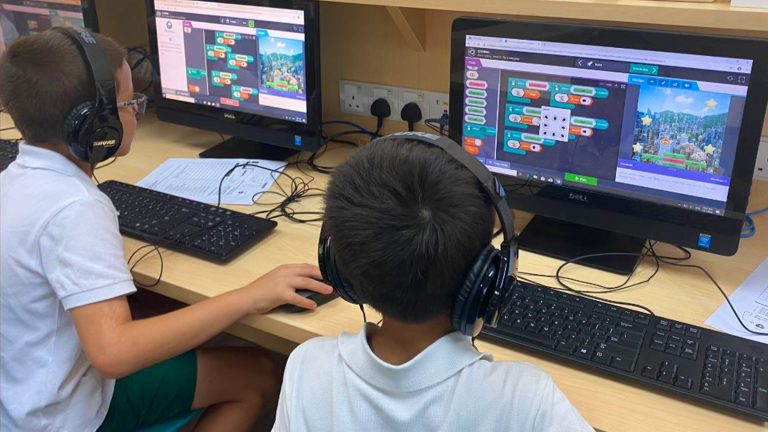The Alice Smith School, Malaysia is one of the oldest and most prestigious British international schools in Asia. Based in Kuala Lumpur, the school welcomes children from around the world and teaches over 1600 pupils from pre-school to Year 13.
The school follows a British curriculum, and teachers use Discovery Education Coding to bring primary computing to life. Computing Specialist Catherine Archer explains how the platform helps students to build vital skills and supports blended learning during the COVID-19 pandemic.
CURRICULUM-MATCHED CODING
We started using Discovery Education Coding earlier this year. As a specialist computing teacher, I know what I’m looking for and what works in the classroom. I could immediately see that this platform was right for our school, particularly at Key Stage 2. It’s closely mapped to the British National Curriculum and covers key coding concepts. It’s easy for teachers to use and engaging for children.
MAKING CODING FUN
One of the things I like best about Discovery Education Coding is how it’s structured. The different levels help pupils to understand concepts such as sequencing, selection and debugging, while short activities allow children to build and see results quickly. There are bubbles that pop, floating ghosts, racing planes and aquariums with fish that swim across the screen. These colourful concepts really appeal to my students and they love using the platform. They can easily code a game and make it fun.
ACCESSIBLE LEARNING
It is very accessible. Each activity supports individual learners’ needs via use of short videos, onscreen and audio instructions. Most coding platforms involve lots of reading, but Discovery Education Coding is more intuitive. Key words are highlighted throughout, enabling children to check their meaning. This triangle of key words, video and audio enables every child to succeed. For this reason, the platform really wins out for me in terms of accessibility.
HELPING PUPILS TO GO FURTHER
Discovery Education Coding supports independent learning because each lesson or activity is self-contained. It’s also broken down into small chunks, so students can master each skill before moving onto the next. This makes it easy to differentiate and to help higher ability pupils to progress.
Some of the activities touch upon more complex variables and game playing, enabling these children to go deeper into the maths: e.g. they can use degrees, x/y co-ordinates and Boolean (a branch of algebra in which the values of the variables are the truth values true and false) expressions in their games. This helps me to make each lesson a little more challenging. The platform also provides the cornerstones of computational thinking and helps pupils to build problem solving skills. I can extend their learning with algorithm writing or by setting a challenge at the end of a tutorial.
SUPPORT FOR TEACHERS
Discovery Education Coding offers extensive teacher support and you don’t need to be a specialist to use it. The platform includes explanatory videos and helpful lesson plans. I like the fact that teachers can pick it up and run with it without help. Many non-specialist teachers lack the confidence to teach coding and particularly struggle with debugging. As its tutorials are self-contained, and deal with one topic at a time, it’s much easier for teachers to help pupils to problem solve.
DISTANCE LEARNING
It’s vital that children can access good quality computing resources while studying at home. I’m using Discovery Education Coding to support distance learning during the COVID-19 pandemic, and it’s working well. I tend to pre-record my coding lessons and I combine this with Discovery Education’s online coding activities. With my Year 3 pupils, for example, I’ve been using the platform to teach key coding words. So, we’ll focus on several activities and one key word which underpins these, e.g. input. We’ll look at the activities to get used to the specific blocks, and I’ll assess the children at the end of the lesson using an external multiple choice quiz.
SPARKING IMAGINATION
Recently, my Year 4 pupils took part in a coding challenge organised by Discovery Education and COBIS. Using the platform at home, they designed their own apps featuring ‘everyday hero’ characters. They began by designing characters and backgrounds before adding code to create sound, movement and scoring. The challenge really fired their imagination and they created some brilliant apps! One student designed a game featuring a famous environmentalist fighting through a jungle, while another created a superhero dog racing across a maze. From a home learning perspective it was a real success!
IGNITING CREATIVITY
It supports the development of creative thinking and offers a good balance between tutorials and independent learning. There’s plenty of room for creativity with open-ended activities at the end of each unit and a free code area where pupils can code from scratch. This is the area that my students enjoy most. They love the opportunity to be independent and to exercise their imagination. There’s a complete library of coding blocks that they can use to build exciting games.
CODING FOR EVERYONE
For me, Discovery Education Coding is one of the most accessible resources that I’ve come across. It caters for every child and can be used by specialist and non-specialist teachers. Kids can create something very quickly and build a fun game or app that they are proud of. There is nothing more delightful than seeing a child create something and share it with friends, saying “Look at this! Isn’t this brilliant? Do you want to play my game?” That’s the ultimate goal for every coding lesson. To encourage peer review and sharing. We see that a lot with Discovery Education Coding, and it’s lovely.



